Cloud PBX
Cloud PBX systems have arrived, and they bring with them many advantages over traditional on-site systems. Even larger companies that can afford to maintain that traditional on-premises infrastructure have increasingly been adopting cloud PBX solutions.
Connect with a Vonage expert today to learn more about cloud PBX options.
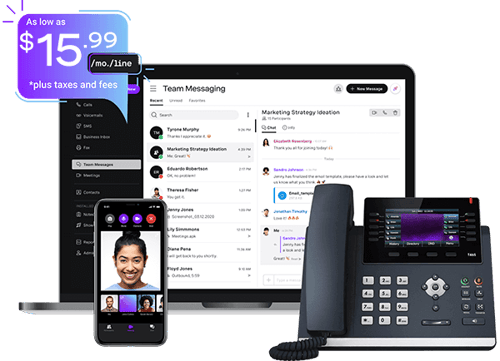
Thanks for reaching out!
We'll get back to you as soon as we can. In the meantime, feel free to explore more about Vonage and how we're making communications more flexible, intelligent, and personal so our customers can stay ahead.
All the Features of a Cloud PBX Phone System and More
While cloud PBX phone systems provide enhanced functionality, it’s possible to get even more out of your business communications. How? By using a unified communications solution like Vonage Business Communications (VBC).
VBC Mobile App
The days of missing crucial client calls are long gone, thanks to the VBC Mobile App. Available on both iOS and Android, this handy application turns your phone into a mobile office. Make and receive business calls and SMS messages from your main company number on the go.
Virtual Receptionist
Every incoming call is sent in the right direction with Virtual Receptionist — aka, an auto attendant. Enable a variety of settings depending on your work schedule or share schedules across your organization to align communications for multiple teams. A sophisticated call management system can also be set up to make sure calls reach the best possible recipient.
Customized Phone Numbers
Make it easy for your clients to get in touch via customized phone numbers. Give a professional impression with one unified international number or create local business numbers for each country in which you operate, so your customers can call you without paying extra.
Secondary Line Appearance
With Secondary Line Appearance, you can view the status of another extension on your phone's display. Then, choose to place or receive a call through another extension, or simply to hold it and allow other extensions to join.
Virtual Extension
A Virtual Extension is a direct-dial number that can be forwarded to your employees’ phones, so it’s ideal for remote teams. That’s because it’s not directly connected to a specific phone line. You can easily control settings via the Admin Portal.
Conference Bridge
Easy conferencing is one of the features that set unified communications solutions apart from simple cloud PBX systems. With Vonage’s Conference Bridge, you can host a completely private conference for up to 30 attendees. Conference Bridge numbers are easily shareable, and you can also password protect your conferences, if needed.
Company Call Recording
Schedule both inbound and outbound calls to be recorded according to your preferences. With Company Call Recording, you choose who has access to the recorded calls, which can be a great help for your monitoring and training procedures. Rest assured, recordings are password-protected and archived for security.
Single Sign-On
Enjoy the convenience of a single, centralized authentication and password management protocol for all users of VBC. This helps your team quickly and easily access the services they need.
Call Park
Call Park puts calls into a kind of virtual holding pen that anyone available can pick up, so it’s great for improving efficiency. With an active call in a “parking spot”, multiple users have access to it, rather than having to choose one user or group to transfer it to.
Simultaneous Ring
Simultaneous Ring is ideal for making sure that your company never misses crucial client calls. It allows you to set a group of extensions or numbers to ring at the same time when particular calls come in. This feature is included in the Call Forwarding menu in the VBC app settings.
Busy Lamp Field
Monitor the status of up to 50 phones in your system at a glance with Busy Lamp Field (BLF). Each number shows up as “ringing,” “on a call,” or “idle.” Each BLF key on your phone acts as a speed-dial key for that number, so you can reach whoever you need to, fast.
HD Voice
Be assured of the best-quality sound on your voice call with HD Voice, available for all Vonage Business Communications applications. Once it’s enabled, all mobile, web, desktop, and physical phones will benefit from the high definition sound quality on supported devices.*
*HD Voice is only available on supported devices
What is Cloud PBX (Private Branch Exchange)?
Cloud PBX services are business phone systems that use a cloud-based service to control and manage calls to and from a business.
To understand this, it’s useful to know a little more about the background of traditional legacy business phone systems.
Historically, landlines run via a Public Switched Telephone Network (PSTN) were the only kind of business telecoms system available. All business lines then had to go through bulky, on-premises telephone infrastructure setups to route calls to the correct people — these were traditional PBXs.
As the internet came of age and Voice over Internet Protocol (VoIP) technology was developed, it became possible for third-party providers to offer cloud PBX VoIP services. These systems took the place of on-premises PBX, and handled the routing and management of calls off-site, in the cloud.
What are commonly described as modern PBX cloud services are not all alike. Some cloud-based PBX systems used by small businesses are still fairly basic in terms of functionality, offering just the traditional routing and management of calls.
More often, however, systems known as cloud PBX are actually better described as comprehensive VoIP-based phone systems.
Security and compliance
Secure communications that meet your industry’s regulatory requirements. See VBC Security & ReliabilityThe 99.999% claim is based on Vonage's average up-time and/or availability.
How Does a Cloud PBX System Work?
Cloud-based PBX solutions come in several flavors, depending on what exactly is going on in the cloud. All provide managed business phone services, but only some use a top-quality VoIP platform to manage calls and offer multiple integrations.
Most modern cloud PBX software enables the routing of voice calls over an internet connection — but that’s where the similarities end. That’s why it’s critical to better understand the differences between legacy PBX, cloud PBX, and UCaaS (Unified Communications as a Service).
Understanding the Differences Between PBX, Cloud PBX, and UCaaS
It’s time to take a closer look at the different types of business phone systems that are available today:
- On-premises PBX: Let’s start with the basic legacy PBX model. The upside is that you have more direct control over every aspect of your system. However, traditional on-premises PBX systems need significant investment in on-site communications infrastructure, which is costly to maintain.
- PBX in the cloud: Hosted cloud PBX systems, on the other hand, make crucial additional functionalities possible. With cloud-based management, you can take advantage of features such as automated routing for inbound calls and smart Interactive Voice Response (IVR) menus. But if you’re considering a cloud PBX service, you should always make sure to establish exactly what you’re getting for your money.
- UCaaS (Unified Communications as a Service): Where modern technology really comes into its own is in the case of a fully unified UCaaS solution. This solution brings together all communications channels onto a single platform. So, not only can you use UCaaS for inbound and outbound calls, but you can also embrace other crucial channels such as web chat, SMS, and video. The result? Your business can benefit from a genuinely unified business communications environment.
Why Are Small Businesses Moving to Cloud PBX and UCaaS over Legacy Systems?
Cloud PBX and UCaaS are becoming increasingly popular with small businesses. Here are just a few of the reasons why:
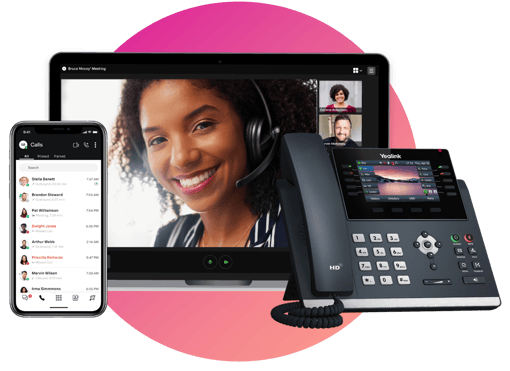
Cost-effectiveness
One of the biggest advantages of cloud PBX (and VoIP-based communications in general) is the impact on the bottom line.
Most smaller organizations simply don’t have the resources to invest in maintaining their own on-site infrastructure. With cloud-based solutions, most services are paid for on a monthly subscription calculated per user, meaning it’s possible for even small startups to have their own tailor-made communications platform.
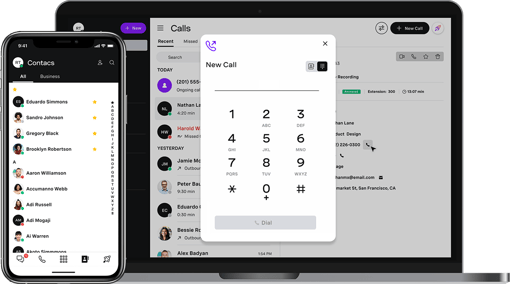
Omnichannel Servicing
Rather than paying for a whole array of different services to deal with web chat, video conferencing, voice calls, SMS, or social integrations, UCaaS platforms enable all of these features in the same digital ecosystem.
This has the added benefit of aligning your customer data across different channels, which is helpful for both your employees and your customers.
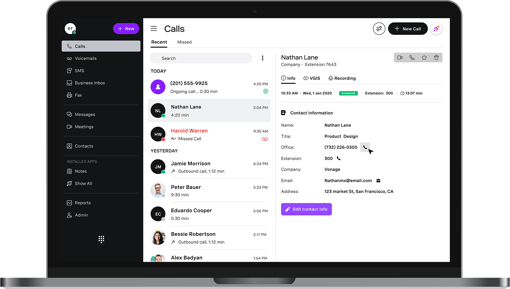
Scalability
One of the reasons expensive legacy-style on-site systems are a non-starter for smaller companies is that they are difficult to scale quickly as a company grows.
This would generally involve physically installing new lines or systems to meet the needs of new employees. With a cloud-based system, you simply scale up as you go by adjusting your monthly subscription to accommodate recent joiners.
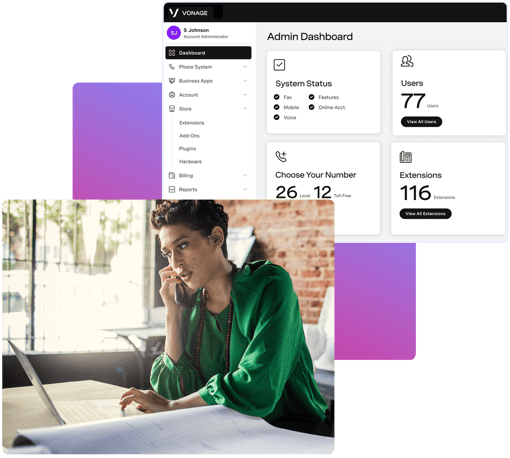
Mobility
Traditional on-site PBX systems are — by their very nature — rooted to the spot, since they depend heavily on the infrastructure on the premises to function.
That means they don’t tend to be a good fit for mobile, remote, or hybrid workforces. By contrast, systems that use VoIP technology can be used from anywhere as long as your team members have access to an internet connection.
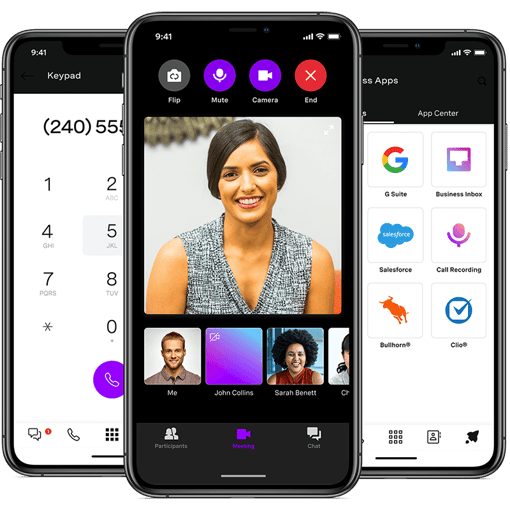
Feature-Packed
UCaaS has an advantage over choosing cloud PBX because it unleashes the potential of handy VoIP features that would never otherwise be within budget for smaller organizations.
Valuable functionality such as CRM integrations, visual voicemail, fully customizable call routing and call forwarding, as well as call recording and transcription, are just some of the benefits a UCaaS system has to offer.
Futureproof Your Business With the Right Communications Solution
Looking ahead is a sure-fire way to position an organization for future success. This means implementing tomorrow’s standards, today.
Cloud-hosted PBX and UCaaS platforms offer a glimpse into what’s coming down the line. It’s crucial to make the right choice of communications solution so that you stay one step ahead of the competition.
The choice isn’t always easy, but at Vonage we have years of experience in guiding businesses just like yours to find the perfect fit for their needs.
Talk with one of our experts today and find out how you can achieve truly unified communications for your business.
FAQs About Cloud PBX
Both of these terms are used to refer to a system where a third-party provides a virtual PBX service to allow companies without their own communications infrastructure to use telephony systems over an internet connection. The difference is that a hosted PBX system could be located on a physical, off-site server or in the cloud. Whereas, a cloud PBX system is always hosted in the cloud.
VoIP is the protocol used to send telecommunications signals directly over an internet connection, whereas cloud PBX describes a cloud-based phone system hosted by a third-party provider.
Hosted cloud PBX services use the VoIP technology to deliver their services, but they don’t all provide the kind of additional functionality you’d expect from a fully customizable UCaaS solution.
A cloud PBX service is usually charged on a monthly basis per user. This makes it great for smaller businesses that might not be fully mature yet.
It eliminates the need to invest large amounts of money in on-site infrastructure that might end up being a hindrance if it doesn’t grow as fast as anticipated. Additionally, if an organization needs to make cutbacks, it can quickly reduce the number of PBX user licenses it pays for, making immediate savings.
UCaaS platforms add a whole dimension of functionality on top of what you’d get from a standard cloud PBX service.
The emphasis on delivering a truly unified communications product is evident in everything, from the omnichannel support that lets you connect with customers across multiple digital channels (video, web chat, etc.) to the integrated analytics based on real-time data.